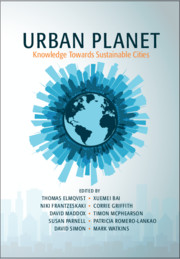Today is the day. Imagine that we wake up and, suddenly, everything has changed. The way we live, the places we live in. Social injustice, discrimination, poverty, hunger, homelessness, illiteracy; spatial segregation, lack of basic infrastructure and services; evictions and forced displacements; insecurity and violence; corruption, authoritarian and undemocratic regimes; environmental degradation and increasing vulnerability to disasters; unsustainable production, distribution, consumption, transportation; and settlement patterns, all are just a terrible memory from the past.
Today we wake up and, suddenly, our societies are guaranteeing that every human being on this planet and each member of the generations to come has the opportunity to live a fulfilling life “in dignity, good health, safety, happiness and hope.”Footnote 1 Nobody suffers discrimination or violations of their human rights and fundamental freedoms; we all have access to adequate housing, food and nutrition, education, culture and recreation, health, sufficient income, justice, and peace.
Imagine that, today, every person and every community is playing a fundamental role in making all this possible. Imagine that every actor and sector participates in truly democratic and effective decision-making processes. Imagine that local, provincial, and national authorities and all other public institutions fulfil their mandate of governing by obeying, ensuring “responsiveness to the needs of people,” respecting participation, transparency, and accountability. Imagine that multilateral agencies and the private sector are also working under the same principles.
Imagine that, today, the economy (production, market, money) has changed its rules and mechanisms, which will now work on the basis of complementariness and solidarity, rather than of competition and competitiveness, to provide the goods and services for people’s well-being. Imagine that our societies provide fair compensation to those in charge of socially relevant work, and that no one takes more than what is necessary for a good living.
Imagine that, today, we all operate with “respect for the carrying capacity of ecosystems, we all cooperate in a spirit of global partnership to conserve, protect and restore the health and integrity of the Earth’s ecosystem.” We all commit to “promote the conservation, rehabilitation and maintenance of buildings, monuments, open spaces, landscapes and settlement patterns of historical, cultural, architectural, natural, religious and spiritual value.”
But how did we get here?
We decided to take seriously our commitments, understanding that to be able to meet them, we needed to get back and honor the different types of knowledge that our communities have been producing for generations, focusing on addressing social justice while respecting Mother Earth’s rights.
We built social consensus around the worldviews that provided the ethical transformations we needed, making explicit the multiple links between the principles and values that promote and protect the commons, the responsibility to change urban life (right to the city) and the buen vivirFootnote 2 for all, respecting autonomy and self-determination through both individual and collective rights.
We finally understood that the urban life was neither inevitable nor the unique desirable way of living, and that a fulfilling life in dignity, multiculturalism, diversity, and peace was possible only if possible for everyone, everywhere.
We established a social, solidarity, sharing, and care economy that expanded access to products, services, and opportunities for human well-being, protecting and supporting nonprofit and cooperative institutions and activities.
We committed ourselves to the full implementation of the social function of land and property, guaranteeing democratic access to a place to live while promoting equitable and sustainable use of available land and the reuse of vacant or subutilized units in favor of social housing and community projects. We started prioritizing people suffering from homelessness and populations living in inadequate housing conditions.
Today might be the day to look behind, in order to see ahead.
The global community has just committed herself to a new, ambitious 2030 Development Agenda and an Urban Agenda for the next 20 years. But some fundamental questions are still floating in the air and should be tackled if we really want to move forward on implementation of these agendas. What kind of knowledge will we need in order to achieve them? What kind of knowledge, and for whom, will we produce in that process? What kind of capacity building do we need to provide for the different actors involved? What kind of professionals will we need to train? And how is all that going to transform us as individuals and societies?
It would certainly take more than a long, deep dream to make that day come true. Still, thousands of experiences all over the world are showing us that this utopia is possible.

